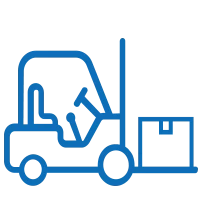If your warehouse operation relies heavily on electric forklift trucks, do you know what the real cost to your business is? And if not, how to work this out?
Electric forklifts are commonly used across a wide range of different industries. A 2-tonne electric lift truck is often a popular choice in logistics due to its versatility. It can be used for many different tasks. From moving pallets and stacking goods in warehouses, to stocking shelves and managing inventory in distribution centres or backroom stores. These forklift trucks are also frequently found transporting raw materials and finished goods in manufacturing operations, and in the loading dock across numerous operations.
Here we take a look at some of the factors you need to consider when planning your materials handling fleet, in order to understand the real cost of owning an electric forklift. Because it’s about more than the initial acquisition, although that is a good place to start.
Buying an electric forklift
The initial financial outlay is a key factor to consider when acquiring a 2-tonne electric lift truck. This could be the purchase price or up-front leasing costs, plus associated investments such as taxes and insurance, for example.
To understand the total cost of ownership (TCO), other factors to consider include:
- maintenance and servicing costs (and any associated downtime)
- the choice of tyres (and replacements)
- batteries, and battery replacement costs
- battery charging time, energy costs, and installation of infrastructure
- operator costs, including recruitment, wages and training
- costs related to lift truck misuse
- other unexpected extra costs
However, ultimately, the TCO for a 2-tonne capacity electric lift truck comes down to its usage. So, what challenges do you rely on your electric forklifts to overcome?
Does your electric forklift operate in tight warehouse spaces?
Many modern warehouses are designed with space saving in mind, featuring narrow aisles and tall racking. Visibility and manoeuvrability are two of the biggest challenges when moving goods in a warehouse with limited space. Both can impact on operational efficiency and costs.
The Yale® Series N electric forklift features a mast which offers excellent visibility through the two channels. In fact, it’s considered best in class*.
When it comes to manoeuvrability in tight warehouse spaces, the zero-turn radius is key. It can support operators in completing tasks efficiently and precisely, contributing to productivity. It can also help to optimise floor space.
Features like these support forklift operators in their jobs and can help to make them feel more confident. This enables operators to complete tasks effectively and efficiently which can have a positive impact on a business’s bottom line.
Will your electric forklifts be operating across long shifts?
Particularly for busy 24/7 warehouse operations, such as in the retail and e-commerce industry, the intensity and duty cycle of the operation can affect the right choice of forklift. Truck reliability and lifespan can be key. For example, a more basic forklift used very intensively would experience more wear and tear. It may need to be repaired more often or replaced sooner. While initial acquisition costs may have been lower, this is a false economy, that would not actually offer a cost saving to your operation in the long term. Conversely, a truck correctly specified for or configured to your operational needs will provide cost benefits.
How do you keep your forklift operators productive?
Another factor to consider is productivity, which is often closely tied to the profitability of an operation. Over long warehouse shifts, operator fatigue can impact on efficiency. That’s why comfort and ergonomics are central to the design of Yale electric lift trucks.
The Yale Series N electric forklift, for instance, has many smart design features that contribute to an enhanced operator experience, boosting confidence and efficiency. Like their ICE counterparts, the new Yale Series N electric forklift models offer a spacious cabin with a user-friendly touch screen as standard. The operator environment can be further customised with dual joystick hydraulic controls, and a variety of comfortable seat options. A comfortable forklift operator is a productive one.
Does your warehouse operation use forklifts inside and outside?
In the past, for operations that move goods both indoors and outdoors, separate trucks may have been required for each stage of the operation. Today, an electric forklift such as the Yale ERP2.2-3.5N can flex to both indoor and outdoor tasks. This is one of the qualities that makes the Series N electric well suited to a wide range of industries, including auto parts distribution, 3PL (third party logistics), retail, furniture, food distribution, beverage, and pharmaceutical industries, and many others.
Purchasing just one forklift to operate in both indoor and outdoor areas of an operation, rather than two, is of course a direct cost saving. Plus, it saves on vehicle storage space. Time is also saved by removing the need for operators to switch trucks during the operation.
What are your maintenance costs?
We all know that regular service and maintenance is required to keep a forklift fleet running effectively. The new Series N electric lift truck models are designed to provide potential savings and lower TCO by helping to reduce the expense of required maintenance. By their nature, electric forklifts feature fewer drivetrain components and less complexity, lowering overall maintenance requirements.
What's more, Yale forklifts and other materials handling equipment are supported by a global network of local Yale dealers who can provide responsive and reliable service and maintenance support, helping to further minimise downtime and associated costs.
How do lift truck sustainability goals affect your operational costs?
The choice of an electric forklift may already be part of your business’s own sustainability goals, with zero exhaust emissions in operation. Battery flexibility offered by the Yale Electric Series N lift trucks allows businesses to select the battery that excels for their operations while managing costs. A choice of lithium-ion, lead acid, or TPPL (Thin Plate Pure Lead) batteries meets differing requirements. For instance, the battery box replacement (BBR) design for the lithium-ion battery option may minimise long-term costs by enabling easier battery replacement and second-life use.
Ask your local Yale Dealer about the Series N Electric Forklift
In conclusion, the real cost of an electric forklift will depend on choosing the right truck for the specific application. It will be influenced by how the truck is used, and the challenges it faces, which will also relate to the lift truck’s longevity.
Configurability is at the heart of Yale Series N trucks. Both the IC and electric Series N trucks are designed with various optional features. This helps the end user match their trucks to the specific needs of their individual operation, while not paying for unnecessary features and options that they don’t need.
Talk to your local Yale dealer today about choosing an electric forklift that can be configured to suit your specific warehouse operations.
*Based on internal measurements between the two mast channels compared to the Linde E3.0, TCM/CAT/Mitsubishi FHB25 and Toyota 9FMB25T. Measurements taken in March 2023.


